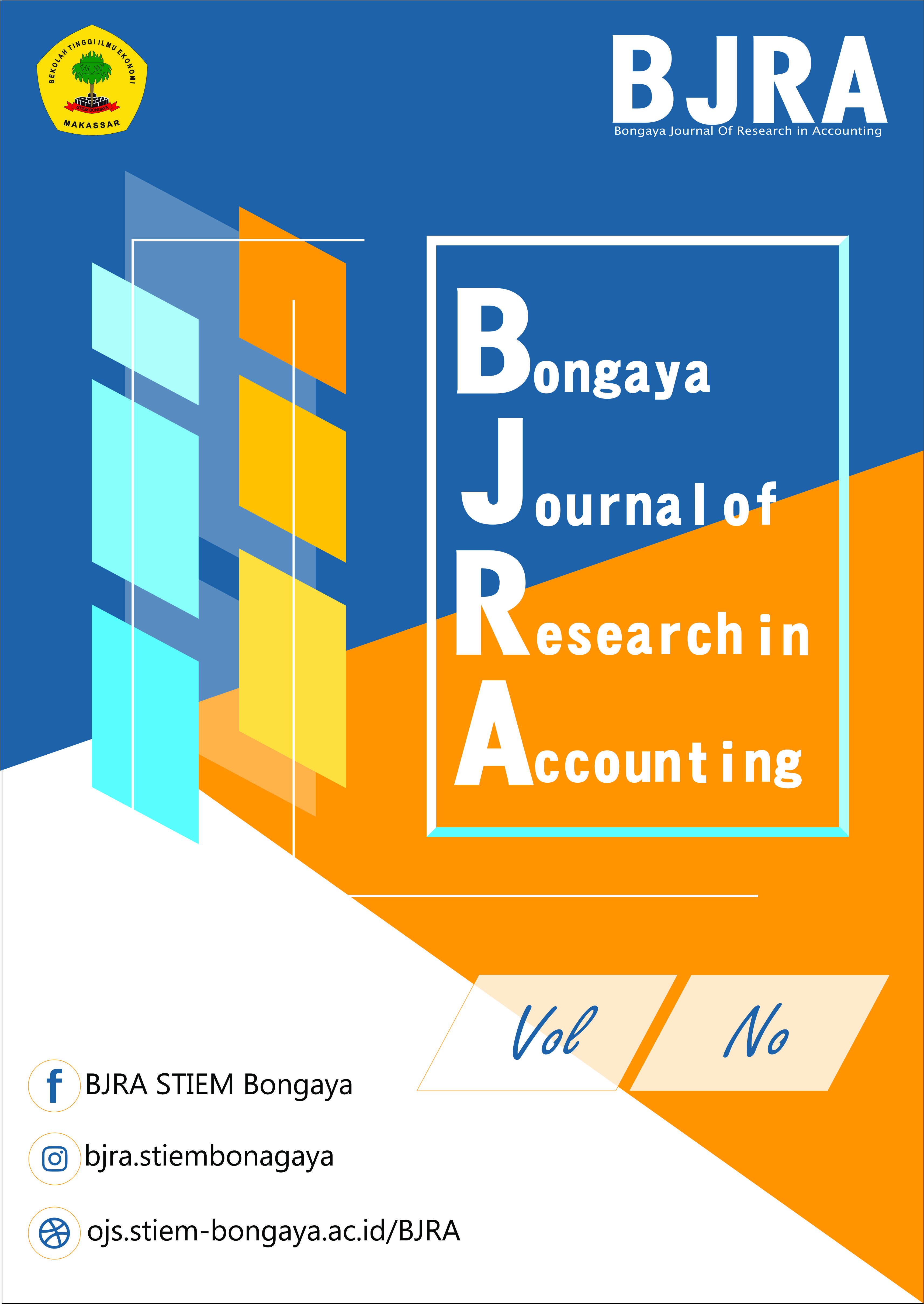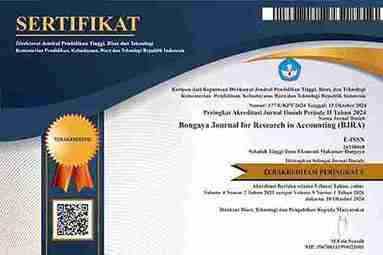The Impact of Online Lectures on Accounting Students' Interest in Learning
DOI:
https://doi.org/10.37888/bjra.v4i1.257Keywords:
Lectures, Perceived Usefulness, Perceived Ease, Interest to Learn, OnlineAbstract
This research examines the effect of online lectures on student interest in learning. This research uses the Technology Acceptance Model (TAM) approach, a theory that explains the perceptions of technology users, which consists of two constructs: perceived usefulness and perceived ease of use. The population in this study were students majoring in accounting at the Kudus Regency College. Sampling using purposive sampling method and the number of samples of 98 respondents. The data obtained were analyzed using the PLS (partial least square) analysis technique through the smartPLS software. The study results found that online lectures had a positive and significant effect on the learning interest of accounting students in the Kudus Regency. This can be seen from the results of testing how perceived usefulness and perceived ease of use have a positive and significant value on student interest in learning.
References
Davis, F. D. (1989). Delle vicende dell’agricoltura in Italia; studio e note di C. Bertagnolli. Delle Vicende Dell’agricoltura in Italia; Studio e Note Di C. Bertagnolli., 13(3), 319–340. https://doi.org/10.5962/bhl.title.33621
Ermawati, N., & Delima, Z. M. (2016). PENGARUH PERSEPSI KEMUDAHAN PENGGUNAAN, PERSEPSI KEGUNAAN, dan PENGALAMAN TERHADAP MINAT WAJIB PAJAK MENGGUNAKAN SISTEM E-FILING (Studi Kasus Wajib Pajak Orang Pribadi Di Kabupaten Pati). Jurnal Akuntansi Indonesia, 5(2), 163. https://doi.org/10.30659/jai.5.2.163-174
Ghozali I. (2014). Structural Equation Modeling, Metode Alternatif dengan Partial Least Square (PLS) (4th ed.). Badan Penerbit Universitas Diponegoro.
Surat Edaran Menteri Pendidikan dan Kebudayaan Republik Indonesia Nomor 4 Tahun 2020 Tentang Pelaksanaan Kebijakan Pendidikan Dalam Masa Darurat Penyebaran Covid-19, Pub. L. No. Nomor 4 Tahun 2020.
Istiyana, A. N., & Fatmawati, F. (2020). Keberterimaan Mahasiswa Jurusan Akuntansi terhadap Pembelajaran Online pada Masa Pandemic Covid-19. AKUNSIKA: Jurnal Akuntansi Dan …, 1. http://jurnal.poliupg.ac.id/index.php/akunsika/article/view/2130
KBBI. (n.d.). Definisi minat.
Mardesci, H., & Mardesci, A. (2020). Pengaruh Perkuliahan dengan Metode dalam Jaringan (Daring) terhadap Minat Belajar Mahasiswa Studi Kasus pada Program Studi Teknologi Pangan Universitas Islam Indragiri). Jurnal Pendidikan Riset & Konseptual, 4(3), 357–365. www.journal.unublitar.ac.id/jp
Mihhailova, G. (2006). E-learning as internationalization strategy in higher education: Lecturer’s and student’s perspective. Baltic Journal of Management, 1(3), 270–284. https://doi.org/10.1108/17465260610690926
Moore, J. L., Dickson-Deane, C., & Galyen, K. (2011). E-Learning, online learning, and distance learning environments: Are they the same? Internet and Higher Education, 14(2), 129–135. https://doi.org/10.1016/j.iheduc.2010.10.001
Mulyana, M., Rainanto, B. H., Astrini, D., & Puspitasari, R. (2020). Persepsi Mahasiswa Atas Penggunaan Aplikasi Perkuliahan Daring Saat Wabah Covid-19. JAS-PT (Jurnal Analisis Sistem Pendidikan Tinggi Indonesia), 4(1), 47. https://doi.org/10.36339/jaspt.v4i1.301
Mustarin, A., & Wiharto, M. (2018). Persepsi mahasiswa terhadap penggunaan program e-learning berbasis LMS pada Mata Kuliah Teknologi Budidaya Perikanan. Prosiding Hasil Penelitian Lembaga Penelirtian Unhas, 249–253. https://ojs.unm.ac.id/semnaslemlit/article/view/8870
Panigrahi, R., Srivastava, P. R., & Panigrahi, P. K. (2020). Effectiveness of e-learning: the mediating role of student engagement on perceived learning effectiveness. Information Technology and People. https://doi.org/10.1108/ITP-07-2019-0380
Rochmawati, Bahtiar, S. M. D., & Rohayati, S. (2019). The Effectiveness of Moodle as E-Learning in Accounting Education Program. 335(ICESSHum), 340–344. https://doi.org/10.2991/icesshum-19.2019.55
Slameto. (2003). Belajar dan Faktor-faktor yang Mempengaruhinya. Rineka Cipta.
Vidantika, P. N. C. D., & Putra, I. M. P. D. (2018). E-Jurnal Akuntansi Universitas Udayana Analisis TAM Terhadap Sikap Penggunaan Sistem Informasi Akuntansi Penggajian di PT Garuda Indonesia Station DPS Fakultas Ekonomi dan Bisnis Universitas Udayana ( Unud ), Bali , Indonesia Fakultas Ekonomi dan Bisnis U. E-Jurnal Akuntansi Universitas Udayana, 24(2), 1105–1134.










